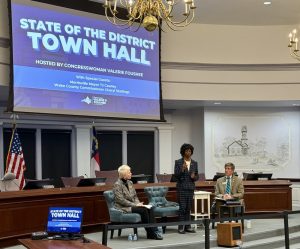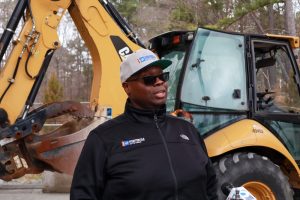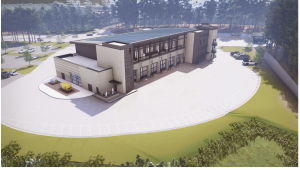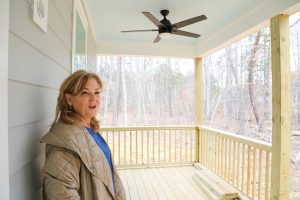Andrea Cobb, a nationally known artist based in Durham, collected and filed away the annual property tax notices she received in the mail for more than a decade. She carefully examined each, paying particular attention to the chart at the bottom of the page explaining how the city spent its general fund — taxpayer money that covers core city services.
“I wanted to know where my taxes are going,” said Cobb, a 55-year-old Durham native whose art clients include Burt’s Bees, INDY Week, Whole Foods and Kleenex.

She saw a glaring trend in the numbers: In 2009, 35% of the general fund spending went to public safety, which includes the city’s police department, fire department, 911 call services and emergency management.
That public safety spending rose steadily over the years, reaching a high of about 52% in the 2017- 2018 fiscal year.
Durham’s final city budgets over the same period show that about 60% of public safety money went to the police department each year.
In 2019, property taxes in Durham paid for half of the general fund’s budget. About 50% of the general fund was allotted to public safety at large, and $65 million of that went to the police department — about 61% of the total public safety budget last year.
Cobb said the realization that a decent chunk of her taxes were going to police, rather than public services like education and social services, concerned her.
“It’s a lot of money,” Cobb said. “And, you know, it’s abusive what police departments are doing, and there’s people in our city that have been killed by police.”
Over the years, Cobb has repeatedly asked city officials publicly and privately about the way the city spends property taxes. She’s still grappling with one question: Why is such a large proportion of taxpayer money going to public safety?
City manager Tom Bonfield told 9th Street Journal that there are several reasons for the increase, including annual raises for police officers and firefighters. “That’s something like a million dollars a year for both the fire department and the police department,” he said.
There are also specific expenses that account for changes over the years, he said. In 2009, the city scaled back the number of police officers covered in the general fund budget for several years and then added them back in later, which led to increases in the public safety budget. In 2017, the city built a fire station and hired 60 firefighters.
“To take a 2009 number and a 2020 number and then try to run the math without going in and looking at every year, it is a significant oversimplification,” he said.
Cobb’s concern about the police budget is one that has been discussed in Durham for years. And this year, it’s top of mind for many residents and officials amid protests against police brutality and the City Council’s recent decision to increase the police budget by 5%.
Gathering the data
Cobb has been a resident of Old West Durham since 1994, and said that illegal activity took place in the duplex she called home for years. One incident involved her neighbor; she called the police due to her suspicions about drug dealing. But she said not much changed after that.
“I got to a point where I’m paying the police to keep me safe, and I don’t feel safe,” she said.
So she started saving her tax notices.

In 2011, she reached out via email to Steve Schewel during his City Council campaign to ask about the budget. According to their email correspondence, he told her to contact him again if he won.
So Cobb emailed again the next year about the suspected drug dealer, writing that she was “a bit peeved with the police asking me to keep helping them given 45% of property tax is paying them to keep [the] district safe,” according to an email she shared with 9th Street Journal.
In 2014, her questions came up in a more public way when the city held a virtual town hall to discuss increasing city property tax rates to pay for voter-approved debt and public safety spending.
Interested residents were asked to submit their questions for the town hall via email or twitter, so Cobb sent an inquiry to former assistant director of Budget and Management Services, John Allore, asking why there was a need for an increase when “so much of taxpayer funds were going to public safety.”
Former mayor Bill Bell told attendees that public safety is a combination of many departments. “I constantly remind others that it’s not just a law enforcement piece alone,” he said, adding that the police budget included enough funding to pay the number of officers the department requested.
Don Moffitt, a City Council member at the time, said the city could always do more to keep the public safer and encourage the police to engage with the community more. “Are we doing enough? That’s what you’re asking, and the answer is, ‘I don’t know.’ We try to hit the balance.”

(For more information on the city expenditures above, click here for an interactive graphic.)
Cobb said that she gave up on contacting city officials after that, since no one followed up with her about her data. “I just got really discouraged by the responses,” she said. “After a few years of persistent effort, I became disenchanted being a lone seeker.”
Mayor Pro Tempore Jillian Johnson was not on the council at the time Cobb brought up her grievances. She told 9th Street Journal that the annual police budget increases this year were largely due to an increase in retirement benefits and an increase in health insurance — things she said the council doesn’t have “much control over.”
“Even if we never hire another police officer in the city of Durham the cost of employing the police officers that we already have will drive the budget up every year,” she said.
Bonfield also said that most social services are covered through Durham County’s budget, and can’t simply be switched from public safety to other areas.
“To say, ‘I don’t want to pay for the police, I just want that money to go to education,’ [is] a misnomer because that’s not the structure of the way the state of North Carolina is around public services,” Bonfield said.
Hope for her hometown
While Cobb has continued to save her tax statements, she isn’t as vocal about it as she used to be. She tries to keep the conversation going with her friends and family. She’s also created more artwork centered around guns, drug use and systemic racism, and said she is open to working with the city should they desire art focusing on these concepts for awareness.
Cobb said it’s “too much” to go out and join protests against police violence at her age, but she supports the effort to pressure cities to defund city police departments.
The work to evaluate police budgets and responsibilities, which has been a years-long conversation among city officials, is progressing in Durham. The City Council recently launched and funded the Community Safety and Wellness Task Force to figure out how to redistribute police services and funding.

City officials will look at their recommendations and determine whether they are financially and operationally feasible. Bonfield said that from a budgetary perspective, conversations about police defunding will not end with the task force recommendation.
“There was an acknowledgment that this wasn’t going to happen overnight and this was an aspiration, not a guarantee,” he said.
Cobb is hopeful that in sharing her tax statements and the observations she’s made, she can help advocate for more clarity from city officials during this time of social unrest, and move towards redistributing police funding.
“My place in Durham’s community is tiny, although I have contributed a lot of artwork for businesses here,” she said. “If I continue to live in Durham, I want to cultivate a bigger purpose.”
9th Street Journal reporter Cameron Oglesby can be reached at cameron.oglesby@duke.edu.
Cameron Oglesby





